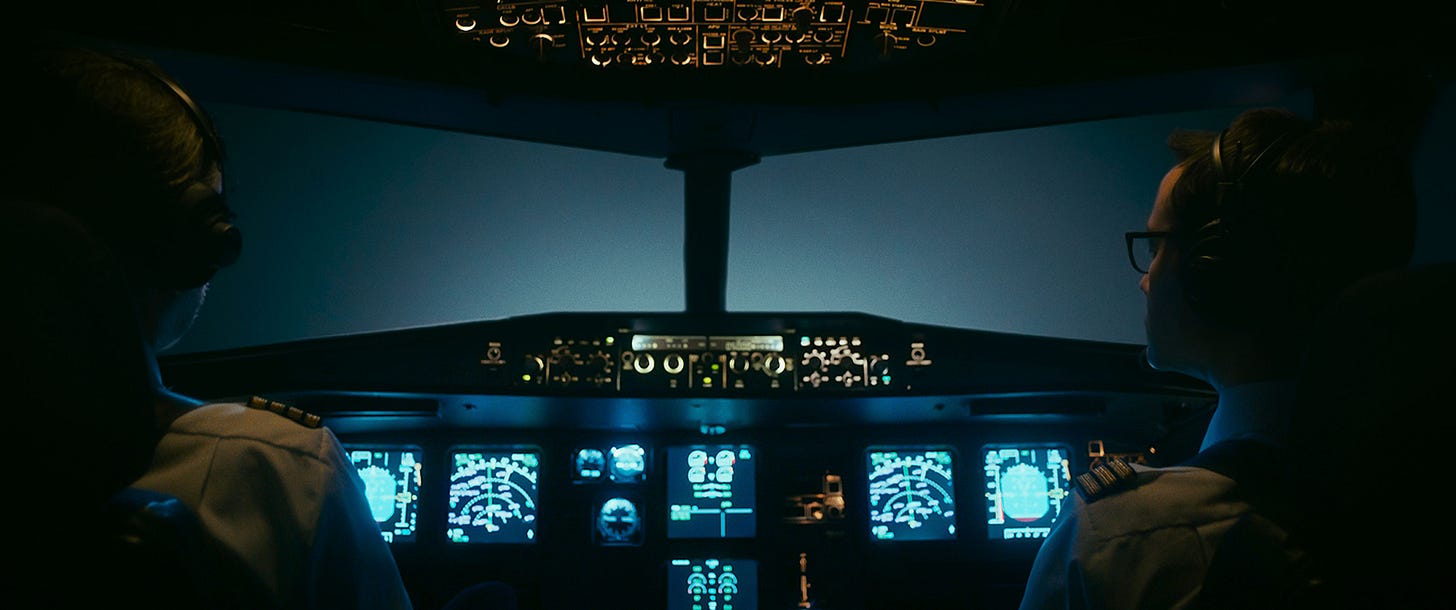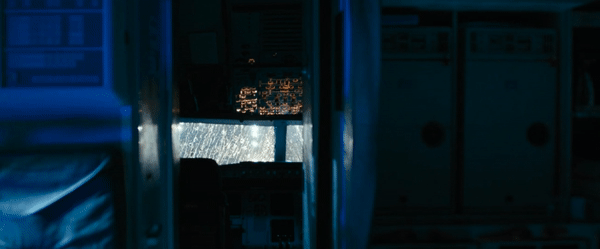7500 is a claustrophobic hijacking thriller that cleverly builds and sustains tension
A (surprisingly short!) spoiler-free review of Joseph Gordon-Levitt's latest movie about the pilot of a hijacked flight. It's taut, tense, and well worth a watch on Amazon Prime.

It takes one hour and 45 minutes to fly from Berlin to Paris. If you’ve ever been on a flight of that approximate length, as I did every winter and summer break from Oakland to Seattle and back to Oakland again, you know that not much can really happen on a flight that short. The airplane takes off, the seatbelt sign flickers on and off a couple times, drinks and a snack are served, you read a few chapters, the airplane descends, and then it’s all over. More than anything, it’s an exercise in killing time. It doesn’t leave much time for something to go wrong — like, say, a hijacking.
7500, a new Joseph Gordon-Levitt film named after the emergency code for a hijacking, takes place almost entirely on that scheduled flight from Berlin to Paris, making it a short film. The movie, available for streaming on Amazon Prime, clocks in at one hour and 32 minutes. JGL plays the first officer, a soft-spoken American pilot named Tobias who lives in Germany with his girlfriend — a flight attendant, who happens to be working that same flight — and their son, who is presumably back at home oblivious to the danger his parents will soon find themselves in. Hijackers are onboard.
The movie, written and directed by Patrick Vollrath in his feature film debut, is told from Tobias’ vantage point. The camera never strays from the cockpit. The entire film is shot from the perspective of Tobias in the cockpit as the plane is almost immediately attacked by hijackers. The end result is a taut, claustrophobic thriller that expertly builds and sustains tension as Tobias navigates his way through a nightmare night at the office. 7500 is an examination of how heroes, villains, and the people merely trying to survive the battle between good and evil respond in moments of crisis. It’s a movie that aims to be more than a conventional thriller and mostly, but not entirely, succeeds in that endeavor.
The film, after an opening credit sequence overlaid with security footage at the Berlin Airport, immediately places us in the cockpit. Here, before the flight takes off, Vollrath crafts a sense of normalcy. Tobias briefly speaks with his girlfriend, Gökce (Aylin Tezel), about their son. They’re trying to figure out where he should go to school. The pilot enters and cracks an icebreaking joke about the plane. There’s a discussion about two passengers who haven’t yet boarded and their luggage that has already been loaded. The passengers barely make it onboard before departure. Pilot and co-pilot run through a pre-flight checklist. They guide the plane to the runway. They give the flight attendants their meal order. Tobias orders a sandwich and water. The pilot only wants water (no bubbles). With dark skies around them, they achieve liftoff.
This might seem boring, but of course, having entered the film with knowledge that the flight will be hijacked, it’s not. You’re left sitting there waiting for the hijacking to begin, watching the pilots operate completely blind to the incoming threat. Depicting the opening procedure also has purpose. For one, it establishes a sense of normalcy that the attempted hijacking will disrupt. It lulls the pilots into a false sense of routine. For most of us, piloting an airplane is an entirely foreign practice we’ll never learn. It’s not something we think much about, even while onboard a plane. Sure, we hope the flight isn’t turbulent and no issues arise mid-flight, but we seldom engage with the how of flying, the mechanisms of flight. The opening moments give us a glimpse behind the cockpit door. As someone who developed into a nervous flyer at some point in my late-teens and remains that way today in my late-20s, I found observing the process comforting and I gained an added appreciation for pilots. With all those buttons and levers, they manage to make their job seem so effortless. For them, it is routine. Above all else, the opening establishes a sense of control. The pilots are in complete and total authority. The hijackers will soon try to seize that power.
Because the camera never strays from the cockpit, the only view we’re afforded of the main cabin is through the security camera on the wall of the cockpit. We only see what the pilots see, which is to say, not much — even less when the flight takes off, the last remaining sunlight disappears, and the flight attendants deploy the privacy curtain to separate the staging area from the main section of the plane.

It’s a short flight from Berlin to Paris, so it doesn’t take long for the hijacking to begin. But even before it does begin, the tension is elevated. For the few brief moments between takeoff and attack, we’re left looking at that curtain through a low-quality camera, waiting for someone threatening to barge through. We all know what’s coming. We just don’t know when. It’s unbearable dread.
Once it does begin, the movie kicks into high gear and sustains the tension for nearly the entire runtime. One hijacker makes his way into cockpit, and injures both the captain and Tobias, who manages to fight off the intruder. The rest of the hijackers are locked outside the cockpit. Tobias ties up the injured hijacker, but doesn’t kill him. As a wounded Tobias guides the plane toward safety — with his back facing the alive, but unconscious hijacker, adding another layer of tension that lingers (when will he wake up and attack Tobias?) — the hijackers in the main cabin threaten to execute hostages unless he unlocks the cockpit door. Along the way, through the in-flight communication system, Tobias manages to connect with one of the hijackers, a young man who has reservations with what he’s gotten himself and others into. And that’s as far as I’ll go in describing the story. How Tobias responds to the hijacking — as a pilot, father, and partner — makes up the majority of the film. I wouldn’t want to ruin it.

What I can do is offer a few comparisons. During my first and only viewing of the film, the movies that 7500 reminded me of were Captain Phillips and Phone Booth.
7500 sustains tension more effectively than Captain Phillips, which loses steam after the pirates take Tom Hanks’ titular character hostage, but 7500 doesn’t handle the aftermath as strongly as Captain Phillips, which did well to empathize with the pirates and masterfully portray trauma. 7500 tries something similar, but here, the runtime works against it. There’s just not enough time for the story to fully humanize the enemy, to allow the audience to entirely empathize with the young hijacker who realizes mid-hijacking that he doesn’t really want to finish what he helped start or for the film to sufficiently investigate the impact of trauma on its characters. It offers surface-level examinations on subjects that could be the basis of entire films.
But like Phone Booth, 7500 uses its limited environment to its advantage. It weaponizes the cramped and confined quarters of the cockpit and the restricted point of view so that we feel as claustrophobic as Tobias. It places us in that chair with Tobias. We’re all the pilot. We’re all trapped.
A movie that it didn’t remind me of was United 93, despite the obvious connection the two films share. United 93 tells its story through the perspective of the passengers, the terrorists, and those on the ground trying to make sense of it all. 7500 limits its perspective to the pilot and only him. It’s not a better film than United 93, but 7500’s more limited scope works to its advantage.
As Tobias, JGL gives one of the strongest performances of his career. Like Hanks in Captain Phillips, he carries the movie. It only works if the performance works, and the performance absolutely works. When we meet him, he’s quiet and awkward in his attempts to socialize — partly because of his inability to speak German, but also because of his natural demeanor — but confident as a pilot. As the situation escalates, Tobias remains mostly quiet, but still confident. There’s protocol for a situation like this, he knows it, and he’s determined to follow it. Eventually, his social skills come into focus as he tries to reason with the hijackers. The flying part comes easy. Communication is Tobias’ greatest challenge. There’s a moment in the film, with the hijacking in progress, when he loses it and unleashes a terrifying shriek. It reminded me of JGL’s breakdown in 50/50, when he freaks out in the driver’s seat of Seth Rogen’s car the night before his surgery. It’s one of the only performances of his career that I think surpasses his performance in 7500 — that and Looper. I don’t know if JGL is considered a great actor, but he’s great in 7500.
JGL is the star, but this is very much Vollrath’s film. His uncompromising commitment to restraining the camera to the cockpit — we never see the tragedy unfold from the perspective of ground control, police, politicians, etc. — was risky, but it paid off in the form of immense immersion. We’re right there with JGL in the cockpit. It feels like we’re Leonardo DiCaprio sitting behind the pilots in the cockpit, watching it take flight and eventually descend. The method lends itself to JGL’s performance. It allows JGL to take over the movie. Like pilot and co-pilot, Vollrath’s storytelling approach enhances JGL’s performance, and vice versa.
Vollrath sticks with his approach until the very moment the credits begin rolling. We never end up escaping the cockpit. The cockpit is just as much a feature of the story as its main character, its villains, and the characters caught somewhere in between — much like The Ring in The Lord of the Rings. It doesn’t have agency. It doesn’t speak. It doesn’t change over the course of the film. Its fate is left in the hands of those who wield it. But with a door as tough as castle walls, it contains strength. Within those doors, it holds tremendous power, as a tool of destruction and as a method of escape. It has a profound effect on those who want to wield it.
Vollrath leaves us with a haunting final shot that is in-keeping with the rest of the film. The pouring rain dips down the glass of the cockpit windshield like tears down a face. It’s one of the only times we’re allowed to exhale during the film.

It’s a short flight from Berlin to Paris. Not much can really happen on a flight of that length. The size of a cockpit is small. Not much can really be done in a cockpit besides flying a plane. 7500 turns those two perceived limitations into strengths, harnessing them and using them to its advantage.
It’s a small movie, but it immediately takes flight and doesn’t come down until the final few moments. It might not soar quite as high as it aims to, but it manages to complete a fulfilling journey nonetheless. As any nervous flier will tell you, simply completing a journey, well, that alone is good enough.
7500 is good enough.



